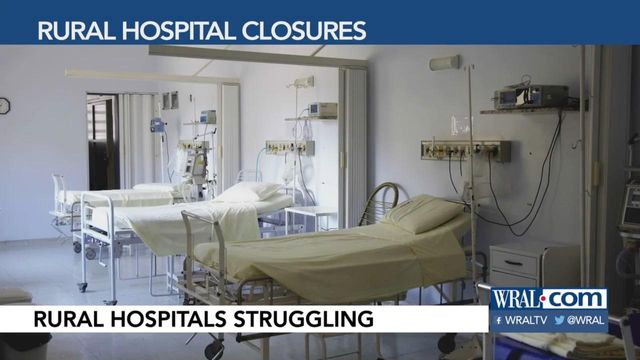A siren often blends in with the background of city noise -- often going unnoticed. But the sound takes on a different meaning for people in some of North Carolina's rural communities.
"When you hear the siren. you wonder," said Joe Williams, owner of Hometown Hardware and General Store in Scotland Neck.
You wonder who the person is, and how he or she is. And you wonder about the precious seconds that add up to the precious minutes it will take to get to the nearest emergency room.
"Because I know that now, they have to make that trip," Williams said.
Scotland Neck residents didn't have to worry about the length of that trip until December 2017, when they lost their local hospital.
"My father had been in the ER and had some excellent action taken on his behalf, said Joe McDowell, owner of McDowell Pharmacy. "My brother. A lot of people in this community wouldn't be here if not for that little rural hospital."
McDowell is a third-generation pharmacist. He was born at that little hospital -- "our community hospital."
It became a statistic in 2017, when it closed its emergency and inpatient services.
"I think as a member of the community, we always felt like help was just a few minutes away -- to go to that hospital, whether it was just to be stabilized and shipped out or airlifted," McDowell said.
Rural hospitals have been closing at an alarming rate. Since 2010, 53 rural hospitals have closed in 11 southern states. Five have closed in North Carolina, including two near the Triad area, one in Blowing Rock and one in Belhaven, right near the coast.
The lone hospital in Washington County is in danger of closing, according to the Associated Press. According to the Arkansas Democrat Gazette, the Arkansas-based company that owns the hospital owes almost $2 million in back taxes across seven states, including North Carolina.
The reason these hospitals are closing is simple math. Many rural towns are losing people -- and especially young people -- to bigger cities, leaving behind a population that relies on Medicare and Medicaid. Since there are no urgent care centers, emergency rooms often serve as places to go when a person has a cold or the flu. All of this combines to put a strain on the businesses and leads to many unpaid hospital bills.
Tom Majure, who was the CEO of the Scotland Neck hospital, said, "We were only seeing three or four people every 24 hours. However, we still had to staff it with a physician, we had to staff it with nurses, we had to staff the lab."
Residents of Scotland Neck now have to drive 23 miles to Tarboro for the nearest emergency room. Contrast that with the Triangle. If you're on Western Boulevard near North Carolina State University, you're less than five miles away from three different emergency rooms. There are three more within a 30 mile radius.
"As you drive from Raleigh to Chapel Hill, you pass multiple hospitals and you kind of see them -- it seems like they are everywhere," said Mark Holmes, a University of North Carolina professor and expert in rural hospital closures. "A hospital is one of those things -- you don't notice it's not there until you need it."
The closures are likely to continue. A recent study from iVantage estimates more than 600 hospitals in the United States are at risk of closing.
Franklin County lost its hospital in 2015, but it was reopened for emergency services last year. Holmes said it's hard to predict which communities could be next.
"For the communities that don't lose it (access to a hospital) you might not think about it," he said. "For the communities that do lose it, devastating might not be too strong a word."
For Scotland Neck, it's been tough and it causes worry.
"You're without it," Williams said, "so it's a little nervous feeling it gives you when you wake up at night and you're sick and you know you have got to drive further."





